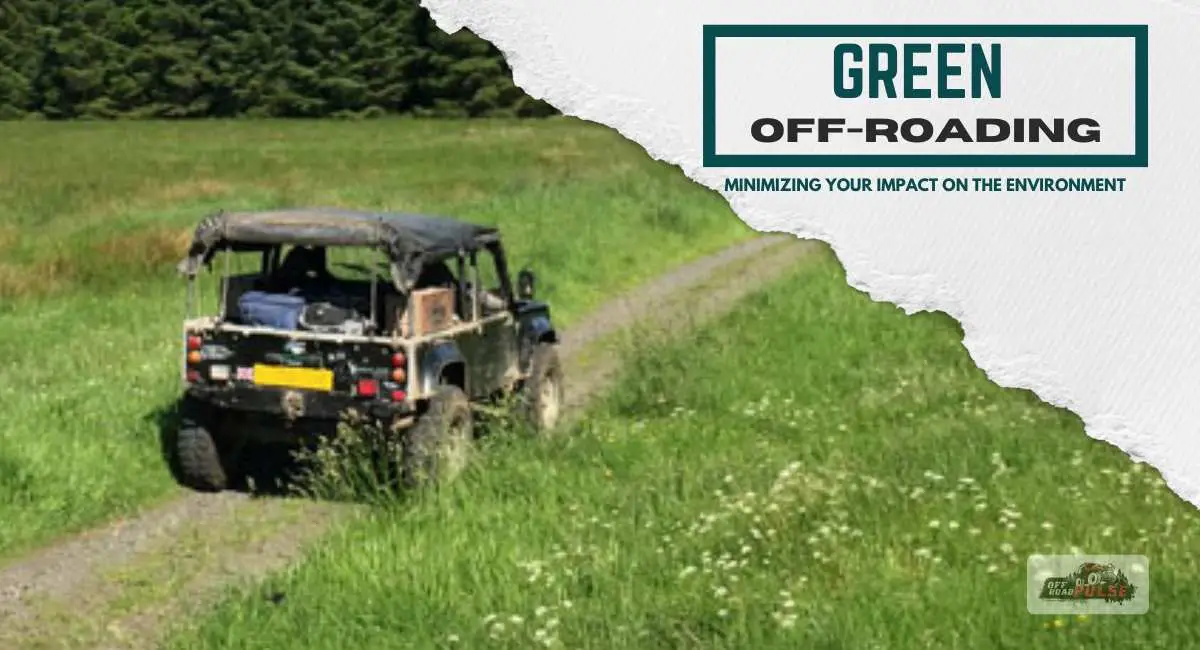Off-roading is an exhilarating pursuit enjoyed by adventure enthusiasts seeking a close connection with the great outdoors. The popularity of off-roading has soared, with riders seeking remote and challenging landscapes to test both their skills and the capabilities of their vehicles.
However, off-roading has raised environmental concerns due to its impact on ecosystems and natural habitats. The thrill of conquering challenging terrains often results in unintended consequences, such as soil erosion, destruction of vegetation, and disturbance to wildlife. These effects threaten the delicate balance of ecosystems and jeopardize the very landscapes off-roaders seek to explore and enjoy.
Green off-roading seeks to address these challenges by adopting eco-friendly practices and minimizing the impact on nature. This approach offers a viable alternative for enthusiasts who wish to explore the great outdoors responsibly.
Importance of Green Off-Roading
There is a tangible surge in awareness among off-roading enthusiasts about the necessity of eco-friendly practices. This awareness is driven by a collective understanding of the environmental repercussions of traditional off-roading and a desire to be more responsible stewards of the great outdoors. Green off-roading holds significant importance in promoting responsible and sustainable practices in the following ways;
I. Preservation of Natural Landscapes
Green off-roading ensures that the scenic beauty of natural landscapes is preserved. Ideally, embracing eco-friendly practices allows off-roaders to minimize the impact on ecosystems by preventing irreversible damage to flora, fauna, and geological features.
II. Conservation of Biodiversity
Green off-roading plays a significant role in the conservation of biodiversity. Green off-roading emphasizes staying on designated trails and avoiding areas with sensitive ecosystems. This helps reduce disturbance and protects the biodiversity of the region. That way, off-road enthusiasts can enjoy their activities while minimizing their ecological footprint.
III. Sustainable Recreation
Sustainable off-roading emphasizes responsible trail use, which involves staying on designated paths and avoiding environmentally sensitive areas. By doing so, off-road enthusiasts can minimize their impact on ecosystems, reduce soil erosion, and prevent habitat disturbance.
IV. Community Stewardship
Engaging in green off-roading fosters a sense of community stewardship. Off-roading clubs and enthusiasts become advocates for responsible practices, leading initiatives such as trail maintenance projects and cleanup efforts to protect and preserve off-roading areas.
V. Mitigation of Environmental Impact
Traditional off-roading practices can lead to soil erosion, habitat destruction, and disturbance to wildlife. Green off-roading mitigates these negative impacts by minimizing the environmental footprint of off-roading activities on natural resources and ecosystems.
VI. Future Generations
Green off-roading practices create outdoor spaces that remain accessible and enjoyable for future generations. Preserving these areas ensures that people can continue to connect with nature while ensuring that future generations can experience the beauty of untouched wilderness and diverse ecosystems.

Sustainable Off-Roading Practices
As we have mentioned, green off-roading thrives on practices that prioritize environmental well-being and responsible outdoor recreation. Adopting these practices contributes to the preservation of natural landscapes and the promotion of sustainable off-roading. This often entails embracing the ‘Tread Lightly’ Principles, which emphasizes responsible off-roading behavior to minimize impact on natural resources.
Tread Lightly Principles
Educate Yourself
Stay informed about local regulations, guidelines, and the specific rules of the area you are exploring. Understand the unique characteristics of your environment to minimize your impact.
Travel Responsibly
Stick to established trails and designated routes to prevent damage to vegetation and soil. Avoid creating new paths or shortcuts that can lead to habitat disruption and soil erosion. In addition, avoid sensitive areas like wetlands and habitats to minimize ecosystem disruption.
Respect the Rights of Others
Respect the rights of others by yielding the right of way to fellow outdoor enthusiasts. Maintain low noise levels to avoid disturbing both people and wildlife while ensuring a considerate and enjoyable environment for everyone.
Do Your Part
Do your part by participating in conservation initiatives, trail maintenance, and cleanup events. Encourage a collective commitment to responsible practices within the outdoor community by fostering a shared responsibility for the well-being of natural spaces.
Avoid Sensitive Areas
Steer clear of fragile environments to prevent habitat degradation. Stay on established trails to minimize the impact on the surrounding ecosystem and delicate environments.
Dispose of Waste Properly
Dispose of waste properly by packing out all trash, including packaging materials, to leave no trace of your presence. Ensure responsible waste disposal by properly discarding fluids and food scraps in designated areas.
Leave What You Find
Avoid picking plants, removing rocks, or disturbing historical or cultural artifacts. Preserve the natural and cultural features for others to enjoy.
Minimize Campfire Impacts
Minimize campfire impacts by using established fire rings and adhering to regulations. Keep fires small and ensure they are extinguished thoroughly before leaving.
Plan Ahead and Prepare
Plan ahead and prepare by researching and organizing your trip in advance. Consider factors like weather, regulations, and logistics. Ensure you’re adequately equipped to minimize the need for emergency interventions.
Respect Wildlife
Respect wildlife by observing from a distance and avoiding direct interaction. Refrain from feeding or disrupting their natural behaviors.
Comply with Signage
Comply with signage by adhering to posted signs, regulations, and guidelines. Respect any area closures or restrictions indicated by signage for a safe experience.
Eco-Friendly Gear and Accessories
Sustainable Off-Road Apparel
Embracing sustainable off-road apparel plays a great role in promoting environmentally friendly practices within the off-roading community. Consider going for gear made from eco-friendly materials such as organic cotton, recycled polyester, or hemp. These fabrics not only provide durability and comfort during off-roading but also reduce the environmental impact associated with traditional off-road apparel.
Sustainable Footwear
If you’re planning to include hiking as part of your off-road activities, your choice of footwear should be a crucial consideration. Look for sustainable options that incorporate the use of recycled materials, eco-friendly dyes, and responsible manufacturing practices. The footwear should not only provide the necessary support for outdoor activities but also lessen the impact on the environment.
Low-Impact Tires
Invest in tires designed for low environmental impact. Low-impact tires are designed to minimize environmental harm during off-road activities. Look for tires with a tread pattern that minimizes soil disturbance to help reduce erosion and damage to vegetation.
Portable Trash Compactors
Portable trash compactors offer a convenient solution for effective waste management during outdoor activities. These containers enable users to compress waste, making it easier to pack out trash and reducing the overall volume of disposed materials.
Biodegradable Trail Markers
If you need to mark trails or paths, use biodegradable markers instead of plastic or non-biodegradable options. This ensures that markers will break down naturally after some time. Also, when maintaining off-road vehicles, opt for biodegradable lubricants and fluids. These products break down naturally, thereby reducing the risk of contaminating the environment during routine vehicle maintenance.
Reusable Water Bottles and Containers
Choose reusable water bottles and containers to reduce the environmental impact caused by single-use plastic waste. Stainless steel or BPA-free plastic alternatives often provide a sustainable solution for staying hydrated during outdoor activities.
Green Lighting
For off-roaders who depend on electronic devices during their adventures, getting a portable solar panel can come in handy. Harnessing solar energy allows off-roaders to power their gadgets while minimizing the need for traditional generators. You may also want to switch to energy-efficient LED lights for better visibility with lower power consumption.
Environmentally Friendly Recovery Gear
Consider using environmentally friendly recovery gear to minimize your impact on the environment during off-road recoveries. This includes tree-friendly straps, synthetic winch lines, collapsible shovels, portable sand mats, and low-impact anchors.
Responsible Camping Practices
Camping while off-roading offers the chance to connect with nature, but this privilege comes with a responsibility to minimize our footprint on the environment. Embracing responsible camping practices, guided by the principles of ‘Leave No Trace’ ensures that we leave the wilderness pristine for future generations. Here are some of the practices you can adopt to ensure responsible camping;
- Research and obtain necessary permits before embarking on your camping trip. Familiarize yourself with the area’s regulations, weather conditions, and local wildlife.
- Stick to the designated campsites to minimize the impact on vegetation and soil. Avoid creating new campsites to help preserve the natural beauty of the surroundings.
- Pack out everything you bring into the camping area. Dispose of waste properly, including human waste. Use designated facilities and follow Leave No Trace principles for waste disposal.
- Follow regulations regarding campfires and obtain necessary permits. Use established fire rings or portable stoves to minimize the impact on the ecosystem.
- Observe animals from a distance and refrain from feeding or approaching them. Store food securely to prevent wildlife encounters and to ensure the safety of both campers and animals. Avoid picking flowers or disturbing vegetation unnecessarily.
- Keep noise levels down, especially during quiet hours. Respect the privacy and tranquility of fellow campers in the area.
- Choose eco-friendly and durable camping gear. Opt for reusable items to reduce waste during your camping trip.
- If fishing, follow catch-and-release practices to preserve fish populations. Obey fishing regulations and obtain the necessary licenses.
- Tread lightly with vehicles and stay on established trails to prevent soil erosion. Adhere to off-road driving regulations and respect trail closures.
- Participate in trail maintenance projects and cleanup events. You may also want to support and contribute to local conservation initiatives.
Waste Disposal Strategies
- Carry a sufficient number of trash bags to collect all your waste, including food wrappers, packaging, and other items. Make sure your campsite or off-road area looks as undisturbed as possible when you leave.
- Separate recyclables from general waste. Many camping areas and off-road facilities have recycling stations or collection points. Prioritize items that can be recycled, such as plastic bottles, aluminum cans, and glass containers.
- If you have a campfire, bring a portable fire pit or container to contain ashes and fire debris. Allow ashes to cool completely before disposal.
- Refrain from burning plastic, rubber, or other materials in the campfire. Burning such items releases harmful pollutants into the air. Burning trash can also leave unsightly remnants and contribute to environmental pollution.
- Collect and store hazardous waste, such as batteries, used oil, or any chemicals, in designated containers. Locate nearby disposal facilities or recycling centers that accept hazardous waste and drop off these items appropriately.
- Participate in or organize clean-up events to remove litter and debris to help maintain the cleanliness of natural spaces.
- If possible, separate organic waste, such as food scraps, and compost them. Use designated composting areas or facilities if available.
- Dispose of used bandages, medical wipes, or any other bio-waste in a sealed plastic bag. Ensure to dispose of this bag in designated waste receptacles.
Supporting Conservation Efforts
Supporting environment conservation is a great step towards ensuring that off-road activities have minimal negative effects on the environment while maintaining the balance of ecosystems. Here are various ways you can actively contribute to conservation efforts;
Follow the Set Rules and Regulations
Adhere to the set rules and regulations for off-road activities to ensure the protection of sensitive habitats and wildlife. These guidelines are in place to prevent habitat degradation, biodiversity loss, and soil compaction resulting from off-road vehicles.
Choose Responsible Recreation Areas
Opt for responsible recreation areas by choosing designated off-road zones approved for recreational use. These areas are typically equipped to manage such activities with minimal impact on the environment. This will ensure that your off-road adventures align with environmental sustainability and contribute to the preservation of natural ecosystems.
Join or Support Conservation Organizations
Support conservation organizations by dedicating your time or offering financial assistance to local and global initiatives. These groups often pursue projects aimed at preserving ecosystems and advocating for sustainable practices. This plays a significant role in safeguarding biodiversity and promoting responsible environmental practices on a global scale.
Volunteer for Clean-up Initiatives
Participate in or organize clean-up events in off-road areas. This can involve removing trash, debris, and any other pollutants that may have accumulated due to human activities. These simple acts contribute to the restoration and preservation of natural environments, ensuring a cleaner and healthier space for both wildlife and fellow outdoor enthusiasts.
Promote Sustainable Practices
Encourage and promote sustainable off-road practices within your community. Share information about responsible recreation and the importance of preserving natural areas. You may also want to stay engaged with local and national policymakers to advocate for stronger conservation policies.
Support Habitat Restoration Projects
Support initiative projects aimed at repairing damaged ecosystems. This includes planting of native vegetation, restoration of water sources, or the creation of wildlife corridors. These efforts help rejuvenate natural habitats, enhance biodiversity, and promote the overall health of ecosystems.
Practice Eco-Friendly Off-Roading
Consider using eco-friendly vehicles and equipment for off-road activities. Choose options that have lower emissions and are designed to minimize environmental impact. This commitment helps preserve the natural beauty of off-road areas and supports a greener, more sustainable future for outdoor enthusiasts.
Conclusion
Green off-roading stands as a beacon of change in the off-road community. This trend represents a harmonious coexistence between the thrill of off-road adventures and the preservation of natural landscapes. Anyone embracing green off-roading becomes an ambassador for environmental stewardship, demonstrating that the love for adventure can walk hand in hand with a profound responsibility to protect our planet. Ideally, the future of off-roading lies in the tracks of those who choose to drive responsibly, ensuring that the landscapes that fuel our excitement today will continue to captivate the generations to come.




